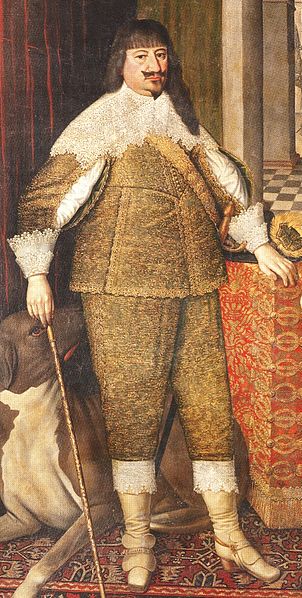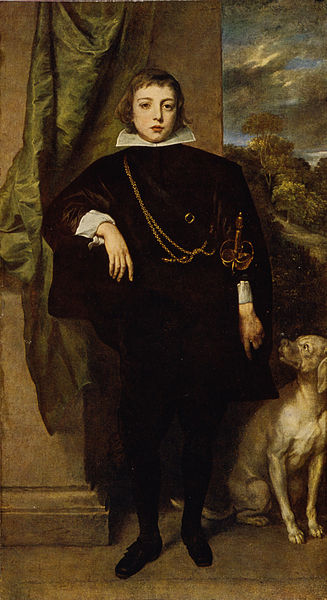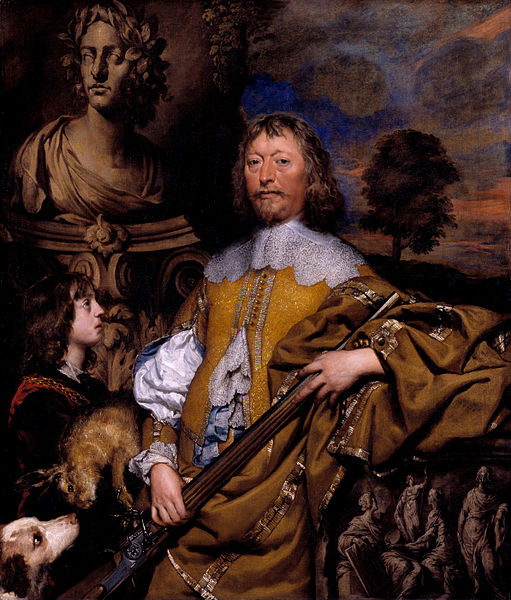 |
| Frederick of Bohemia, Elector Palatine |
Birth of a Prince
Prince Rupert was the
third son of Elizabeth of
Bohemia and her husband Frederick
the Elector Palantine and King of Bohemia
at the time of his son’s birth. Rupert was
born in Prague on 17th
December 1619 and was placed in an ebony cradle inlaid with gold and precious
stones, a gift from the burghers of Prague along with swaddling clothes of cambric . His mother had arrived in Prague in November after
an arduous journey while heavily pregnant.
Rupert’s
mother was one of two surviving children of one of Protestant Europe’s most
important monarchs, James I, king of Scotland and of England. When
the news of the birth reached his grandfather in England James;
‘Joyfully asked for a large
beaker of wine and drank to the health of the new born prince in Bohemia.’[i]
 |
| Bethlen Gabor |
Rupert was christened on 31st March 1620, probably in what
is now known as the Church of our Lady Victorious. His godfather was Bethlen Gabor, Prince of Transylvania.
Rupert lived
through an era of turbulence that commenced in 1618 with the start of the Thirty Years’ War. Frederick, as one of the Protestant
Electors of the Holy Roman Empire, saw himself as head of the Protestant Union, a grouping of the German Protestant states.
Frederick was invited by rebels to take the crown of Protestant Bohemia to keep
it out the hands of the Roman Catholic emperor Ferdinand II’s choice of monarch.
Flight into Exile
 |
| Battle of White Mountain |
On 8th
November 1620 the Battle of White Mountain[ii] signalled the end of Frederick’s
tenuous hold on Bohemia when the royal forces led by Christian of Anhalt, Frederick’s general and chief
adviser, fell before the might of the imperial armies. The Impreial forces were
led by Frederick’s Catholic cousin Maximilian of Bavaria, and Anhalt was taken prisoner.
The royal
family beat a hasty retreat from Prague[iii]; Elizabeth was placed in
a private carriage by Bernard, the son of Count Thurn. Rupert nearly got left behind in
the desperate scramble. The baby was left on a sofa and the screaming child,
who had rolled onto the floor, was discovered by Christopher, Baron Dhona.
Dhona picked
Rupert up and threw the baby into one of the carriages where he fell in the
boot. Once again it was only the baby’s lusty yelling that drew attention to
his predicament. The journey to Breslau[iv] was complicated by a heavy fall of
snow.
 |
| George William Elector of Brandenburg |
On the 14th
December the family arrived at Custrin, part of the domains of George William, Elector of Brandenburg and Frederick’s
brother-in-law. George William
gave grudging permission for Elizabeth, once again heavily pregnant, to shelter
at Custrin. On the 17th December Elizabeth gave birth to Maurice.
On 21st
January the Emperor made Frederick an outlaw; many of Frederick’s allies threw
themselves on the Emperor’s mercy. Frederick’s cousin Maximilian was given the Palatine
Electorate. The young Henry Frederick wrote to his grandfather in England;
‘Sir, we are come from
Sewnden to see the King and Queen and my little brother Rupert who is now sick.
But my brother Charles is
now, God be thanked, very well, and my sister Elizabeth,
and she is a little bigger and stronger than he.’[v]
Rupert,
along with his older brother Henry then travelled on with their mother to the
Netherlands to the court of Prince Maurice while the baby Maurice was taken
into the care of his grandmother Juliana[vi] in Brandenburg. Prince Maurice gave
the exiled family a house, the Hof te Wassenaer and a monthly pension of 10,000
guilders. In the summer Frederick was given 150,000 guilders to raise an army.
A Childhood in Exile
 |
| Elizabeth of Bohemia |
Elizabeth
was a distant mother, always keeping her numerous children at a distance[vii], preferring to play with
her monkey and dogs. Elizabeth’s main focus was her husband with whom she was
very much in love. But of her children Rupert was to become her favourite.
Frederick was proud of his third son’s precocious abilities; when Rupert was
three his father wrote;
‘The little Rupert is very
learned to understand so many languages.’[viii]
Rupert was
to become fluent in High and Low Dutch as well as German and some Czech. He
also read English, French, Italian and Latin. Frederick appointed a Monsieur
and Madame de Plessen to act as governors to his children, with instructions to
bring them up as strict Calvinists.
The young
Rupert was fiery and often misbehaved and was called Rupert le diable. His mother decided that Rupert and Maurice were
to be trained as soldiers so that they could espouse their father’s cause once
grown.
R
upert
enjoyed horse riding, the use of weaponry and the study of fortifications; his studies
at the University of Leiden included painting and drawing; his
art teacher was Gerard van Honthorst. With the death of Henry Frederick in
a tragic accident
on 7th January 1629, Rupert’s second brother Charles Louis became heir to his father’s
responsibilities.
 |
| Prince Rupert |
Frederick
died, still in exile, on 29th November 1632; Rupert was not yet 13.
The following year Rupert joined his great uncle Frederick Henry, now Stadtholder[ix] and Captain General of the Dutch army, at the siege of Rheinberg. Elizabeth said of Rupert;
‘He cannot be too soon a
soldier in these active times.’[x]
She was keen
for her boys to learn the skills that would allow them to regain the Palatine. After
the success of the siege Rupert returned to his studies and to the court where
he attracted much attention from the ladies. Two years later Rupert was back at
the front, fighting in Brabant as part of the Prince of Orange’s lifeguard.
Whitehall
 |
| Rupert and Charles Louis |
When he attained
the age of eighteen the young Charles Louis was invited to the court of his
uncle Charles, who had ascended to the thrones of
Scotland and England following the death of his father James in 1625. Three
months later Rupert joined his brother; both Charles Louis and Rupert were shy
and ill at ease in society. Their mother wrote to Sir Henry Vane the Elder asking him to advise Rupert, writing
of her son;
‘He is good-natured enough,
but does not always think of what he should do…..he will not trouble your
ladies with courting them.’[xi]
Sir Thomas Roe described Rupert;
‘His Majesty takes great
pleasure in his [Rupert’s] unrestfulness, for he is never idle; in his sport
serious, in his conversation retired, but sharp and witty when occasion
provokes him.’[xii]
 |
| Sir Thomas Roe |
Rupert’s
love of the arts drew him to his uncle Charles, who collected old masters. He
also enjoyed the masques, the plays and music at court. While the queen, Henrietta Maria, believed she could convert this
ardent Calvinist into a Roman Catholic.
The teenage
Rupert was highly eligible and his mother and uncle set about finding him a
bride. Only a Protestant was considered acceptable and the front runner was Marguerite de Rohan[xiii]. The marriage failed to come about,
in part due to the death of the Duc de Rohan before negotiations could be
completed. Charles continued to push for the marriage even during the war that
was to tear England apart.
Charles
Louis and Rupert accompanied their aunt and uncle on a visit to the University of Oxford whose Chancellor was Archbishop Laud. On 30th August 1636 Rupert was awarded an
honorary arts degree and his name, along with his brother, was entered in the
register of St John’s College.
Religious Fervour
 |
| Endymion Porter |
One of the
people Rupert met on his visit to England was the courtier Endymion Porter who introduced Rupert to the literary circle that included John Donne and Ben Jonson. Porter was full of get rich quick
schemes and he wanted Rupert to head up an expedition to Madagascar. Rupert’s mother refused to allow her son to be involved; in
one of her more sensible decisions, Elizabeth doubted the project’s
feasibility, thinking that it would compromise Rupert’s honour and safety.
Porter
continued to worry Rupert’s relatives; they feared that he would be persuaded
to change religion. Charles Louis wrote to his mother of his concerns about
Rupert;
‘I find him very shy to tell
me his opinion. I bid him take heed that he do not meddle with points of
religion amongst them [the Porters], for fear some priest or other….may form an
ill opinion in him. Besides…..Mrs Porter is a professed Roman Catholic.’[xiv]
Rupert was
brought home on the excuse that he needed more experience fighting for his
family’s rights. The morning of his departure Rupert went hunting with Charles
and expressed his desire to stay in England. Charles awarded Rupert a monthly
pension of 800 crowns[xv]; uncle and nephew had
become close and Henrietta Maria was convinced that Rupert’s religious
conversion was imminent.
Bibliography
Prince
Rupert of the Rhine – Maurice Ashley, Purnell Book Services Ltd 1976
The Memoirs
of Elizabeth Stuart Vol 1-2 – Elizabeth Benger, General Books LLC 2012
Charles the
First – John Bowles, Weidenfeld & Nicholson 1975
Charles I –
Christopher Hibbert, Penguin Books 2001
Prince
Rupert of the Rhine – Patrick Morrah, Constable & Company 1976
Prince
Rupert – Charles Spencer, Phoenix Paperback 2008
The Thirty
Years War – CV Wedgewood, Folio Society 1999
[i]
Prince Rupert of the Rhine - Morrah
[iii]
Maximilian gave the family eight hours to leave
[iv]
Now Wroclaw
[v]
Prince Rupert - Spencer
[vii]
She and Frederick had 13 children, the youngest of whom was ten months old when
Frederick died
[viii]
Rupert of the Rhine - Ashley
[ix]
Maurice died in 1625 leaving his brother to inherit his positions
[x]
Prince Rupert - Spencer
[xi]
Rupert of the Rhine - Ashley
[xii]
Prince Rupert - Spencer
[xiii]
Daughter of the premier Protestant noble in the French court, the Duc de Rohan
[xiv]
Prince Rupert - Spencer
[xv]
In 2013
the relative: historic standard of living
value of that income or wealth is £28,360.00
economic
status value of that income or wealth
is £1,080,000.00 economic power value of
that income or wealth is £6,574,000.00 www.measuringworth.com
"When the news of the birth reached his English grandfather James;". His grandfather was not English. James was born in Scotland to a Scottish Queen. His mother Mary Stuart was half Scottish and half French. His father Lord Darnley was three quarters Scots and one quarter English.
ReplyDeleteYou are of course right and I have amended accordingly. Thank you for bringing the error to my attention
Delete